Infinite Exploration
A text-based adventure game where the world you're exploring is crafted entirely by the players!
Like any text-based game, you use simple commands to explore and interact with the world, and move from one scene to the next. But what happens when you come upon a room which hasn't been created, yet? It's your turn to create! Players are invited to write the room description of any room they stumble upon that hasn't been written, yet.

It's an introvert's multiplayer online game - the world you're exploring was entirely created by other players, but players don't actually interact with each other beyond leaving behind stories and artifacts. It is a decidedly non-social game, so players can explore peacefully and at their own pace.
Instructions
The main gameplay element is the description of the "room" or "scene" you're in. This gives you your bearings, and tells you where you can go from here. Then, anything in that room description can be typed as a command to "move" to the next scene or "room". These simple game mechanics leave the gameplay wide open, since anything can be a trigger to move to anywhere else.
Every word, every phrase, every string of characters that you can put together from that room description can be used to create a doorway to move to the next "room". That means any object in the room, any door, any direction, any action word, anything at all can lead to the next "scene".
Since it's so open-ended, players often use CAPITAL LETTERS to indicate when a word in the sentence is meant to lead a player to the next "scene". This helps players find their way around the more obvious parts of the world. But since any phrase can lead to a new "room", poking around for secret rooms can be quite fruitful!
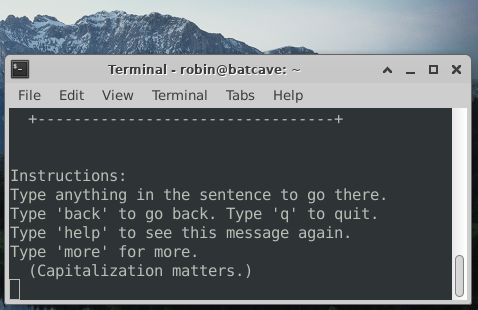
There are only a handful of words which can't be used as player-created commands, which are "commands" reserved for the game. Those are help, back, q, quit and exit. Type "help" to read the instructions, "back" to go to the previous room, and "q", "quit", or "exit" allow players to quit the game at any time.
You can also type 'more' while you're at the 'help' screen to see more instructions for advanced users. If you want the labrynth of the game to not only go "forward" and "backward", you can link back to previous rooms using a "pin". The phrase "drop pin" can be used in any room, to bookmark that room, and later when you go to a room that "doesn't exist", instead of just writing a new room description, you can link it back to the other room by just writing "pin".
As you can see by the very short instructions, the game is made to be as simple and easy to pick up and play as possible. In fact, the program itself is only about 100 lines of code! Which means the games themselves are almost entirely created by the users, which is why I won't ever charge money to play. Although, I will beg for donations now and then. ;D
Getting Started
This game is hosted over telnet or SSH connection. To log in, you just have to believe as you type it in: whereanythingispossible
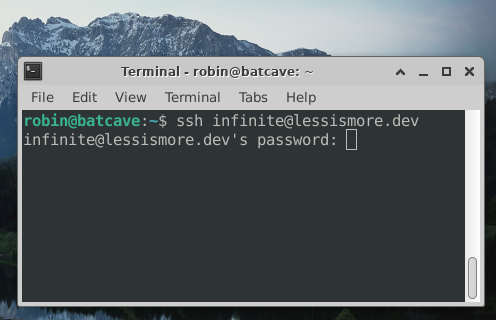
No accounts are necessary, no login needed.
Everyone plays as "anonymous".
If you don't know how to use SSH, you can just use an app on your phone like JuiceSSH to log in and play the game.

You just need the username in the weird format of "name@server" and then the password, and technically everyone is just logging in as the same user.
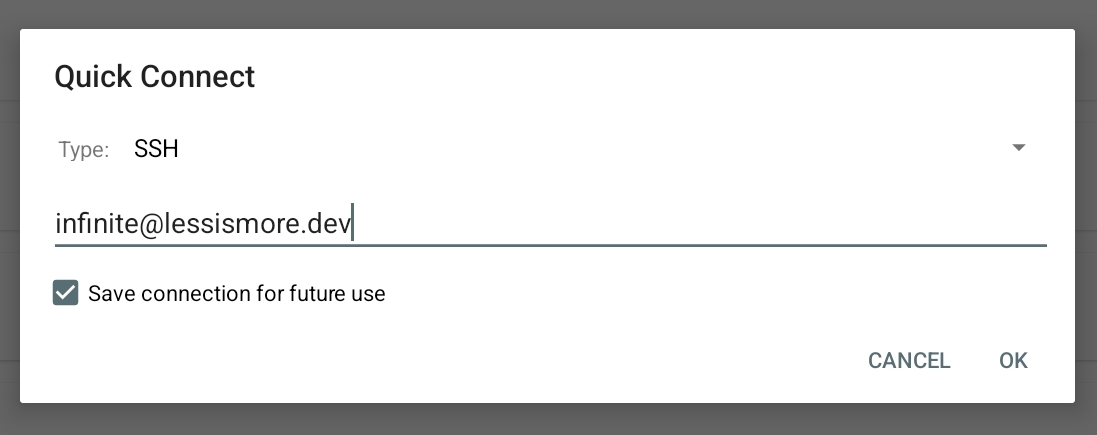
The way I use it, I just use the "Quick Connect" but then every time it says "Authentication Failure!" but it's really just asking for the password for the first time.
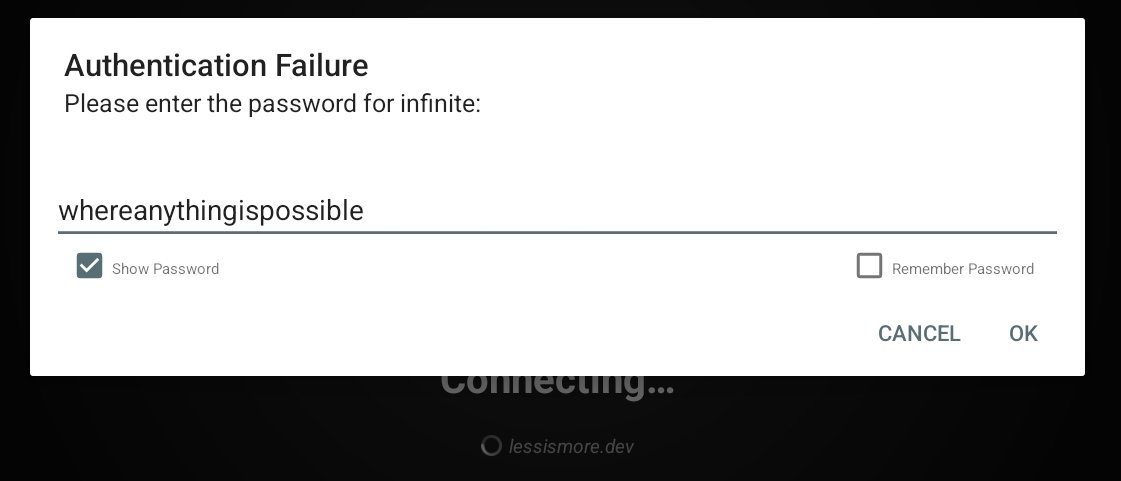
If you enjoy the game, you can donate any amount using paypal, but only if you really want to!
There are a number of worlds to choose from, but the world called "intro1" was made to help you get your bearings with how to play the game. And keep in mind, when you "quit" a world, you will lose your connection to the server and have to input the password again to get back in.
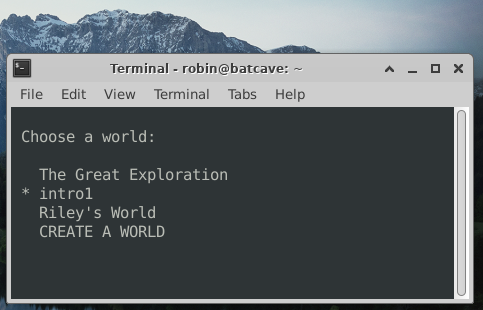
The Vision
This started with the simple idea of making a text-based adventure that could be created on-the-fly by all the players as they play it. A sort of collaborative paradise for creativity, where anything is possible. I like to encourage creativity, and this was a fun way to "force" people to be creative. You can explore all you want, but if you're the first one to walk through a door, suddenly you're forced to create the next room!
After some test playing, I realized the more timid players who want to "look but don't touch" might feel too much pressure to be creative if they were "forced" to write a room description every time they find a new room. The very people I'm trying to encourage to be more creative, or more expressive out in the open where other people can find it, might be scared away from playing at all! At the same time, I realized the medium was being used for some really active and involved story-telling and it doesn't always make sense to be forced to create a room without having explored other rooms a little bit, first. So I finally capitulated to let the "back" command be used even when you're being asked to write the room description, so you could back up without being "forced" to be creative.
All that said, I hope you'll recognize the good intentions behind "forcing" people to write room descriptions, and I encourage you to write room descriptions instead of just backing up all the time! The more people contribute, the more there is to explore, and the more stories there are to add to!
The Geeky History
At first, I thought there would be different objects and verbs, but then it seemed very complicated, and soon it seemed to require creating a whole in-game scripting language. The less is more philosophy, or KISS as many people know it (Keep It Stupid Simple) led me to keep tinkering with just how simple it could be without requiring any previous knowledge to play it. I certainly didn't want a whole in-game scripting language..
The first version had two commands, "look" and "go". This allowed everything to have a description of just looking at it, and a description of "going" to or through or whatever. This meant everyone could "look" at everything in the room, take it all in, see if there is any hints or guidance on where to go next. But this ended up meaning you look at everything before you "go" anywhere, and it just felt like everything required two questions, two descriptions, two steps before moving to the next room.
It was only once I set out to refactor the program and make it as few lines as possible that I realized I could easily remove ALL the commands, and just make the phrase from the sentence the only "command" you have to type. This had the wonderful effect of basically allowing players to just put any "action" words in the room description for an even more active exploration! Now instead of just "look" and "go", you could literally do anything! And I did manage to get the program down to 100 lines of code, which I was very happy about. :)

The Quirks
The game is written so "back" can be used to back up at any point. This was the easiest way to keep all the rooms logically connected, and give people a way to find their way back to where they've been. But it had this interesting effect of connecting everything into branching stories, like tree branches, where you could spread out and down any path but always have a way directly back to the beginning using the "back" command. Since this is such a linear "forward" or "backward" pattern, it lends itself very well to story-telling and choose-your-own adventures! Any choice is a branching path, but going back will always just undo the choices you've made and let you explore other paths of the story.
While branching stories became incidentally easy to create, the experience of exploring an area that snakes and winds and interconnects became quite difficult. As the worlds develop, the branching storylines can feel restrictive, like you can only move "forward" and "backward" but you can never walk in a circle around a building and end up back where you already were!
That's why I added the ability to "drop a pin" and then link back to a bookmarked room. This means anywhere can link to anywhere, now! The quirk about that is if you skip from one tree branch of the story to another, the "back" command will now transport you backwards through rooms or scenes you may not have seen, yet. So take care how you use the "drop pin" command. I've decided I like the default behavior, and the branching storylines, and I hope people only use the "drop pin" command to make connections that actually make sense. For instance, you might connect back to a room much further back on the same storyline, so the player still has their bearings and recognizes where they are, and the "back" command will still work intuitively for them.
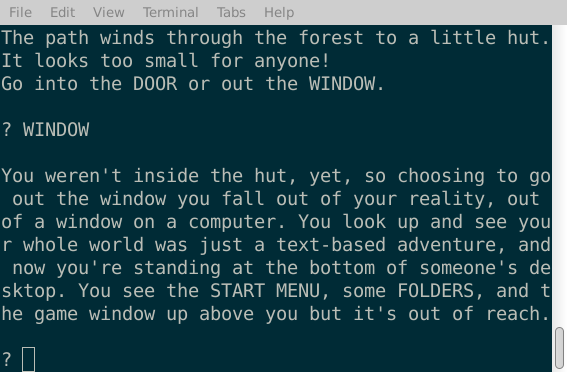
What's The Point?
The Internet was born as a network of sharing information, for scientists to share science and work together to solve the problems of humanity. It arose as a beacon of connection and collaboration. A virtual landscape where everyone was finally free to be themselves, to say what they wanted, to be treated as an equal without being judged for their identity. Without knowing each other's age, race, gender, sexuality, these things could not be used to divide us. The Internet ushered in an era of unprecedented connection and awakening as we all started to become aware of how we're really affecting each other, and what forces are really at play. The Internet gave us a place where people could speak the truth without fear, and without consequence. A place where a revolution could build against the powers-that-be, and they would have no way to stop it.
As the Internet has been taken hostage by advertising, and social media, the hey-day of the Internet seems to be over. An Internet that encouraged creativity, expression, and full participation from even the most thoughtful, introverted, or timid people among us has now become a tool of emotional manipulation, toxic subcultures, and tracking and surveillance so intense that people have actually started turning away from the Internet for the first time. Internet searches are full of useless crap corporations are trying to sell us, social media is full of bots, and sometimes it just seems like there's just nowhere to go with our thoughtful creative energy, anymore.
And that's the POINT of "Infinite Exploration"! There are no usernames, there is no pressure to answer, there are no checkmarks telling each other when you've read a message so you feel pressured to respond. There are no identities, at all. Not even pseudonyms! There is only the world we're building together. I hope this can encourage us to focus our minds in a way that might also translate into real life - that we can stay focused on building a beautiful world together, and stop being divided and confused by mud-slinging identities, social media algorithms, and surveillance-based targeted advertising.
The Internet is not broken, we've just been tricked into spending more and more of our time in mainstream social media cluster#@$%s where everything we do is tied to our identity. This game is a chance to all that baggage behind, and just enjoy the collaborative nature of the Internet without the mess of individual identities and their drama. Take a break from expectations, and just enjoy a collaborative dream world. You never know, maybe the stories we write here can teach us something profound about real life.